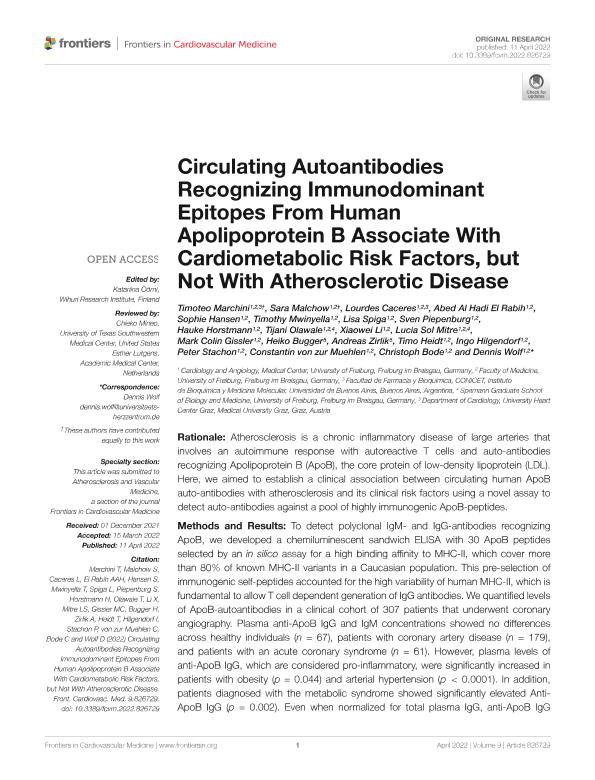Mostrar el registro sencillo del ítem
dc.contributor.author
Marchini, Timoteo Oscar

dc.contributor.author
Malchow, Sara
dc.contributor.author
Caceres, Lourdes
dc.contributor.author
El Rabih, Abed Al Hadi
dc.contributor.author
Hansen, Sophie
dc.contributor.author
Mwinyella, Timothy
dc.contributor.author
Spiga, Lisa
dc.contributor.author
Piepenburg, Sven
dc.contributor.author
Horstmann, Hauke
dc.contributor.author
Olawale, Tijani
dc.contributor.author
Li, Xiaowei
dc.contributor.author
Mitre, Lucia Sol
dc.contributor.author
Gissler, Mark Colin
dc.contributor.author
Bugger, Heiko
dc.contributor.author
Zirlik, Andreas
dc.contributor.author
Heidt, Timo
dc.contributor.author
Hilgendorf, Ingo
dc.contributor.author
Stachon, Peter
dc.contributor.author
von zur Muehlen, Constantin
dc.contributor.author
Bode, Christoph
dc.contributor.author
Wolf, Dennis
dc.date.available
2023-07-21T13:31:02Z
dc.date.issued
2022-04
dc.identifier.citation
Marchini, Timoteo Oscar; Malchow, Sara; Caceres, Lourdes; El Rabih, Abed Al Hadi; Hansen, Sophie; et al.; Circulating Autoantibodies Recognizing Immunodominant Epitopes From Human Apolipoprotein B Associate With Cardiometabolic Risk Factors, but Not With Atherosclerotic Disease; Frontiers Media; Frontiers in Cardiovascular Medicine; 9; 4-2022; 1-11
dc.identifier.uri
http://hdl.handle.net/11336/204732
dc.description.abstract
Rationale: Atherosclerosis is a chronic inflammatory disease of large arteries that involves an autoimmune response with autoreactive T cells and auto-antibodies recognizing Apolipoprotein B (ApoB), the core protein of low-density lipoprotein (LDL). Here, we aimed to establish a clinical association between circulating human ApoB auto-antibodies with atherosclerosis and its clinical risk factors using a novel assay to detect auto-antibodies against a pool of highly immunogenic ApoB-peptides. Methods and Results: To detect polyclonal IgM- and IgG-antibodies recognizing ApoB, we developed a chemiluminescent sandwich ELISA with 30 ApoB peptides selected by an in silico assay for a high binding affinity to MHC-II, which cover more than 80% of known MHC-II variants in a Caucasian population. This pre-selection of immunogenic self-peptides accounted for the high variability of human MHC-II, which is fundamental to allow T cell dependent generation of IgG antibodies. We quantified levels of ApoB-autoantibodies in a clinical cohort of 307 patients that underwent coronary angiography. Plasma anti-ApoB IgG and IgM concentrations showed no differences across healthy individuals (n = 67), patients with coronary artery disease (n = 179), and patients with an acute coronary syndrome (n = 61). However, plasma levels of anti-ApoB IgG, which are considered pro-inflammatory, were significantly increased in patients with obesity (p = 0.044) and arterial hypertension (p < 0.0001). In addition, patients diagnosed with the metabolic syndrome showed significantly elevated Anti-ApoB IgG (p = 0.002). Even when normalized for total plasma IgG, anti-ApoB IgG remained highly upregulated in hypertensive patients (p < 0.0001). We observed no association with triglycerides, total cholesterol, VLDL, or LDL plasma levels. However, total and normalized anti-ApoB IgG levels negatively correlated with HDL. In contrast, total and normalized anti-ApoB IgM, that have been suggested as anti-inflammatory, were significantly lower in diabetic patients (p = 0.012) and in patients with the metabolic syndrome (p = 0.005). Conclusion: Using a novel ELISA method to detect auto-antibodies against ApoB in humans, we show that anti-ApoB IgG associate with cardiovascular risk factors but not with the clinical appearance of atherosclerosis, suggesting that humoral immune responses against ApoB are shaped by cardiovascular risk factors but not disease status itself. This novel tool will be helpful to develop immune-based risk stratification for clinical atherosclerosis in the future.
dc.format
application/pdf
dc.language.iso
eng
dc.publisher
Frontiers Media

dc.rights
info:eu-repo/semantics/openAccess
dc.rights.uri
https://creativecommons.org/licenses/by/2.5/ar/
dc.subject
APOB
dc.subject
ATHEROSCLEROSIS
dc.subject
AUTO-ANTIBODIES
dc.subject
CARDIOVASCULAR DISEASE
dc.subject
IMMUNITY
dc.subject.classification
Sistemas Cardíaco y Cardiovascular

dc.subject.classification
Medicina Clínica

dc.subject.classification
CIENCIAS MÉDICAS Y DE LA SALUD

dc.title
Circulating Autoantibodies Recognizing Immunodominant Epitopes From Human Apolipoprotein B Associate With Cardiometabolic Risk Factors, but Not With Atherosclerotic Disease
dc.type
info:eu-repo/semantics/article
dc.type
info:ar-repo/semantics/artículo
dc.type
info:eu-repo/semantics/publishedVersion
dc.date.updated
2023-07-05T12:23:40Z
dc.identifier.eissn
2297-055X
dc.journal.volume
9
dc.journal.pagination
1-11
dc.journal.pais
Suiza

dc.journal.ciudad
Lausana
dc.description.fil
Fil: Marchini, Timoteo Oscar. Consejo Nacional de Investigaciones Científicas y Técnicas. Oficina de Coordinación Administrativa Houssay. Instituto de Bioquímica y Medicina Molecular. Universidad de Buenos Aires. Facultad Medicina. Instituto de Bioquímica y Medicina Molecular; Argentina. Albert Ludwigs University of Freiburg; Alemania
dc.description.fil
Fil: Malchow, Sara. Albert Ludwigs University of Freiburg; Alemania
dc.description.fil
Fil: Caceres, Lourdes. Consejo Nacional de Investigaciones Científicas y Técnicas. Oficina de Coordinación Administrativa Houssay. Instituto de Bioquímica y Medicina Molecular. Universidad de Buenos Aires. Facultad Medicina. Instituto de Bioquímica y Medicina Molecular; Argentina. Albert Ludwigs University of Freiburg; Alemania
dc.description.fil
Fil: El Rabih, Abed Al Hadi. Albert Ludwigs University of Freiburg; Alemania
dc.description.fil
Fil: Hansen, Sophie. Albert Ludwigs University of Freiburg; Alemania
dc.description.fil
Fil: Mwinyella, Timothy. Albert Ludwigs University of Freiburg; Alemania
dc.description.fil
Fil: Spiga, Lisa. Albert Ludwigs University of Freiburg; Alemania
dc.description.fil
Fil: Piepenburg, Sven. Albert Ludwigs University of Freiburg; Alemania
dc.description.fil
Fil: Horstmann, Hauke. Albert Ludwigs University of Freiburg; Alemania
dc.description.fil
Fil: Olawale, Tijani. Albert Ludwigs University of Freiburg; Alemania
dc.description.fil
Fil: Li, Xiaowei. Albert Ludwigs University of Freiburg; Alemania
dc.description.fil
Fil: Mitre, Lucia Sol. Albert Ludwigs University of Freiburg; Alemania
dc.description.fil
Fil: Gissler, Mark Colin. Albert Ludwigs University of Freiburg; Alemania
dc.description.fil
Fil: Bugger, Heiko. University of Graz; Austria
dc.description.fil
Fil: Zirlik, Andreas. University of Graz; Austria
dc.description.fil
Fil: Heidt, Timo. Albert Ludwigs University of Freiburg; Alemania
dc.description.fil
Fil: Hilgendorf, Ingo. Albert Ludwigs University of Freiburg; Alemania
dc.description.fil
Fil: Stachon, Peter. Albert Ludwigs University of Freiburg; Alemania
dc.description.fil
Fil: von zur Muehlen, Constantin. Albert Ludwigs University of Freiburg; Alemania
dc.description.fil
Fil: Bode, Christoph. Albert Ludwigs University of Freiburg; Alemania
dc.description.fil
Fil: Wolf, Dennis. Albert Ludwigs University of Freiburg; Alemania
dc.journal.title
Frontiers in Cardiovascular Medicine
dc.relation.alternativeid
info:eu-repo/semantics/altIdentifier/url/https://www.frontiersin.org/articles/10.3389/fcvm.2022.826729/full
dc.relation.alternativeid
info:eu-repo/semantics/altIdentifier/doi/http://dx.doi.org/10.3389/fcvm.2022.826729
Archivos asociados
